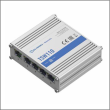Back to Top
Mercury Switch
Description:
- A Mercury Switch is an electrical switch that uses a small amount of liquid mercury to regulate the flow of power.
- The switch is enclosed in a sealed glass tube to retain the mercury within and avoid oxidation.
- Mercury Drop: A little amount of liquid mercury serves as the conducting element.
- Electrodes/Contacts: Metal electrodes or contacts are located within the glass tube. When the mercury meets these connections, the circuit is completed.
- Tilting: The switch works based on its orientation. When the mercury is slanted, gravity causes it to flow to the bottom.
- Circuit Completion: Depending on the tilt angle, the mercury may contact the electrodes, shutting the circuit, or move away, opening the circuit.
- Vibration Sensitivity: Some mercury switches can function as vibration sensors.
- Durability: Because the contacts are encased, they are resistant to dust, oxidation, and other pollutants.
- Reliability: Mercury's conductive qualities ensure a consistent and robust electrical connection.
- Spark-Free Operation: Because the switch produces no sparks, it is safe to use in hazardous areas.
Specifications:
- Material: Sealed glass envelope, mercury, metal electrodes.
- Contact Rating: Up to 5A at 250V AC or 100V DC, depending on the design.
- Contact Resistance: Less than 1 ohm when closed.
- Insulation Resistance: Greater than 100M ohms at 500V DC.
- Operating Angle: activates at a tilt angle between 7° and 25°.
- Response Time: Immediate upon tilting.
- Dimensions: Varies by specific model, small and compact.
- Durability: Long-lasting with high reliability.
- Temperature Range: Usually -40°C to 125°C, but can vary based on the specific design.
| SKU | SWI-0026-H10 |
|---|
Write Your Own Review









